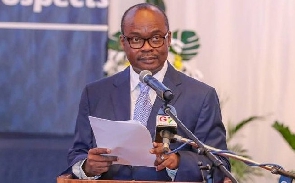Justice For Ghana Covener Bernard Mornah has said Bank of Ghana Governor Ernest Addison has mismanaged the bank to the extent that the United States of America had to send down a representative to keep the operations of the banking sector regulator in check.
Reacting to a comment by former GIMPA Rector Prof Stephen Adei, in which the former member of the advisory board of the finance ministry described the call for Dr Addison's resignation by the minority caucus as "irresponsibile", Mr Mornah, who is a former Chairman of the People’s National Convention (PNC), told Valentina Ofori-Afriyie in an interview on Class91.3FM's mid-day news 12 Liveon Wednesday, 16 August 2023, that the Governor must go so as to bring back confidence in Ghana's monetary regime.
"When you are able to secure a removal of those who have sunk the economy, and, in this instance, the central bank, what simply will happen is that it will bolster confidence; people will begin to say that, 'Well, those who messed up are gone', and the new people that have come in will come with new vigour ... and ensure stability within the monetary system", Mr Mornah argued.
"So, if the governor is seen as a very bad leader and you say that, 'No, if we allow a bad leader to go, it will have ramifications and our currency will depreciate, how is the currency going to depreciate becuase our currency has already depreciated as one of the worst currencies in the world", he observed.
Mr Mornah added: "Now that our currency has depreciated as one of the worst, the USA has sent somebody to come and be at the Bank of Ghana to monitor the operations and activities of the Bank of Ghana".
"Is that alone not sufficient to tell you that our central banker is incapable of handling the affairs of the nation?" Mr Mornah wondered.
The minority caucus, which first called for Dr Addison's resignation, gave him a 21-day ultimatum.
The caucus vowed to "occupy" the central bank to chase the governor out if he remains in office after the expiration of the ultimatum.
The 2022 audited report of the central bank revealed that it made a loss of GHS60.8 billion and recorded a negative equity of GHS55.1 billion.
The minority caucus insists Dr Addison and his two deputies must go for not only destorying the bank but also illegally printing over GHS80 billion and loaning it to the government and subsequently writing off GHS48.40 billion of it without parliamentary approval.
Meanwhile, the central bank has explained that a huge chunk (₵53.1 billion) of the ₵60.8 billion loss it posted in 2022, per its audited accounts, was a direct result of three items that were badly affected by the government's Domestic Debt Exchange Programme (DDEP).
The DDEP, together with an external debt restructuring programme, was critical for securing the US$3-billion extended credit facility from the International Monetary Fund to salvage Ghana's tottering economy.
Explaining the factors that drove the loss, the central bank said: "The main reason for this huge loss is the impairment of the holding of marketable government stocks and non-marketable instruments of government" which were both being held in its books.
"This stock of government instruments has been built over the years", the bank noted.
In addition, the central bank said its "exposure to [Ghana Cocoa Board] COCOBOD, which has been built over the years, was also impaired" by the DDEP.
"The holdings of government instruments and COCOBOD exposures were all part of the perimeter of the debt exchange", BoG indicated, adding: "Whereas all other stakeholders that participated in the Domestic Debt Exchange Programme (DDEP) did not have principal haircuts, but rather had new instruments with new tenors and coupon structure, the BoG served as the loss absorber to the entire debt exchange programme, a key requirement that allowed the Government of Ghana to meet the threshold for the approval of the IMF programme".
As a result, the BoG had to take on a 50 per cent principal haircut on the total principal (which stood at ₵64.5 billion at the time of the exchange)", the bank pointed out. "Consequently, BoG had new instruments with extended tenor and significantly reduced coupon", it added.
The central bank revealed that applying the full requirements of IFRS 9, meant that "from the principal alone, a 50 per cent haircut on the non-marketables amounted to a loss of ₵32.3 billion".
It said the "impairment from exposure to COCOBOD also amounted to ₵4.7 billion". "These three DDEP items (i.e. marketable, non-marketable and COCOBOD) accounted for ₵53.1 billion out of the total loss of ₵60.8 billion for 2022", BoG computed.
"In addition to these three items, price and exchange rate valuation effects accounted for ₵5.2 billion of the total loss, whereas interest expense on cost of monetary policy operation accounted for ₵3.3 billion".
Business News of Thursday, 17 August 2023
Source: classfmonline.com













